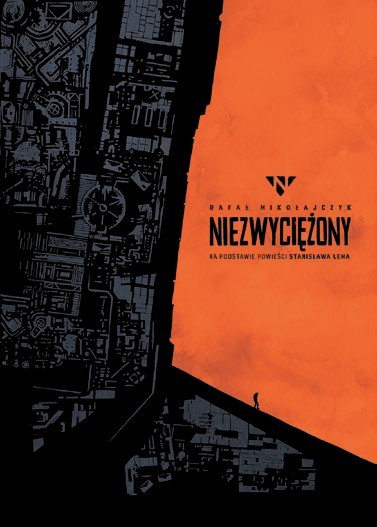A masterful graphic novel adapted from Stanisław Lem

A masterful graphic novel adapted from Stanisław Lem

Translation rights: Booka, kontakt@dobrestronybooki.pl
Foreign language translations: English translation available
Stanisław Lem is among Poland’s most cele- brated and world-renowned authors. His work combines the visionary imagination of science fiction with philosophical musings on human nature. This very fusion makes The Invincible so unique, for this is only superficially a novel about space warfare. It tells the story of the titular ship, which undertakes a rescue mission to an uncharted planet. On this barren world, the crew discover a population of microrobots programmed with one sole task: to annihilate all signs of life. Lem uses this setting as a pretext for meditat- ing on fatalism, otherness, and the impossibility of true mutual understanding.
Rafał Mikołajczyk, author of the graphic novel adaptation, has achieved the unimaginable: he has brought his source to life in a new medium, remaining faithful to Lem in both letter and spirit. By condensing the plot and drawing out its salient motifs, he has preserved Lem’s multi-layered narrative. The result is a skilfully told tale of a crew facing various trials that expose their true nature and prompt them to retaliate. The original novel’s philosophical dimension is left intact: we encounter questions about the meaning of free will and existence.
Mikołajczyk has also given us a gem of graphic artisanship. The comic is rendered in subdued hues of grey and rusty crimson, suggesting a futuristic but technologically archaic vision of another world. What could only be imagined from the pages of Lem’s novel is now tangible. The artist cultivates a convincing atmosphere of strangeness and peril. The Invincible is a true achievement timed beautifully to anticipate the 100th anniversary of Stanisław Lem’s birthday in 2021.
Tymoteusz Wronka
Translated by Eliza Rose
Selected samples
She climbed her first peaks in a headscarf at a time when women in the mountains were treated by climbers as an additional backpack. It was with her that female alpinism began! She gained recognition in a spectacular way. The path was considered a crossing for madmen. Especially since the tragic accident in 1929, preserved … Continue reading “Halina”
First, Marysia, a student of an exclusive private school in Warsaw’s Mokotów district, dies under the wheels of a train. Her teacher, Elżbieta, tries to find out what really happened. She starts a private investigation only soon to perish herself. But her body disappears, and the only people who have seen anything are Gniewomir, a … Continue reading “Wound”
A young girl, Regina Wieczorek, was found dead on the beach. She was nineteen years old and had no enemies. Fortunately, the culprit was quickly found. At least, that’s what the militia think. Meanwhile, one day in November, Jan Kowalski appears at the police station. He claims to have killed not only Regina but also … Continue reading “Penance”
The year is 1922. A dangerous time of breakthrough. In the Eastern Borderlands of the Republic of Poland, Bolshevik gangs sow terror, leaving behind the corpses of men and disgraced women. A ruthless secret intelligence race takes place between the Lviv-Warsaw-Free City of Gdańsk line. Lviv investigator Edward Popielski, called Łysy (“Hairless”), receives an offer … Continue reading “A Girl with Four Fingers”
This question is closely related to the next one, namely: if any goal exists, does life lead us to that goal in an orderly manner? In other words, is everything that happens to us just a set of chaotic events that, combined together, do not form a whole? To understand how the concept of providence … Continue reading “Order and Love”
The work of Józef Łobodowski (1909-1988) – a remarkable poet, prose writer, and translator, who spent most of his life in exile – is slowly being revived in Poland. Łobodowski’s brilliant three- volume novel, composed on an epic scale, concerns the fate of families and orphans unmoored by the Bolshevik Revolution and civil war and … Continue reading “Ukrainian Trilogy: Thickets, The Settlement, The Way Back”























































































































































































































































































